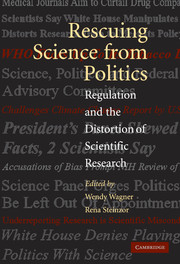Book contents
- Frontmatter
- Contents
- About the Contributors
- Acknowledgments
- Prologue
- Introduction: Principled Science
- PART I FREEDOM AND INDEPENDENCE
- PART II TRANSPARENCY AND HONESTY
- 5 The Data Wars, Adaptive Management, and the Irony of “Sound Science”
- 6 The Dual Legacy of Daubert v. Merrell-Dow Pharmaceutical: Trading Junk Science for Insidious Science
- 7 Using Science in a Political World: The Importance of Transparency in Natural Resource Regulation
- 8 Transforming Science into Law: Default Reasoning in International Trade Disputes
- 9 Two Models for Scientific Transparency in Environmental Law
- PART III A PUBLIC INFRASTRUCTURE FOR SCIENCE
- PART IV RECOMMENDATIONS AND CONCLUSION
- Index
7 - Using Science in a Political World: The Importance of Transparency in Natural Resource Regulation
Published online by Cambridge University Press: 04 August 2010
- Frontmatter
- Contents
- About the Contributors
- Acknowledgments
- Prologue
- Introduction: Principled Science
- PART I FREEDOM AND INDEPENDENCE
- PART II TRANSPARENCY AND HONESTY
- 5 The Data Wars, Adaptive Management, and the Irony of “Sound Science”
- 6 The Dual Legacy of Daubert v. Merrell-Dow Pharmaceutical: Trading Junk Science for Insidious Science
- 7 Using Science in a Political World: The Importance of Transparency in Natural Resource Regulation
- 8 Transforming Science into Law: Default Reasoning in International Trade Disputes
- 9 Two Models for Scientific Transparency in Environmental Law
- PART III A PUBLIC INFRASTRUCTURE FOR SCIENCE
- PART IV RECOMMENDATIONS AND CONCLUSION
- Index
Summary
Shielding Science from Politics
The premise of this book is that the work of doing policy-relevant science – that is, the process of producing the data needed to support regulatory and management decisions – must be insulated to the extent feasible against the vagaries of the political world. That premise is unquestionably sound; the scientific process will generate more reliable information more quickly if it is allowed to function according to its established norms, free of external political or financial momentum pushing toward one outcome or another.
But the premise is also incomplete. “Doing science” is only one part of the policy equation. Scientific information does not directly or magically become policy; it must be interpreted and applied. There is no formula that can objectively translate scientific information into regulatory decisions. Instead, the process of using science to construct policy is a complex one necessarily involving multiple judgment steps. Some of those judgments are essentially scientific, extrapolations or inferences drawn about the natural world from limited data, but many are essentially political, involving choices and trade-offs among societal goals. These two types of judgment are often closely intertwined and difficult to separate. The fundamental challenge of using science in the policy arena is to ensure that political judgments match societal goals and remain accountable to the public, while scientific judgments match our best understanding of the natural world and remain accountable to the relevant scientific community.
- Type
- Chapter
- Information
- Rescuing Science from PoliticsRegulation and the Distortion of Scientific Research, pp. 143 - 164Publisher: Cambridge University PressPrint publication year: 2006



